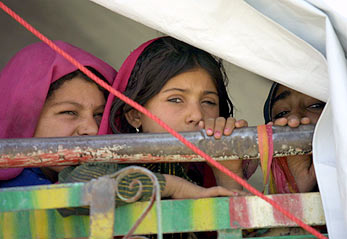UNHCR raises repatriation forecast as Afghan returns surge
UNHCR raises repatriation forecast as Afghan returns surge

ISLAMABAD, Pakistan, May 10 (UNHCR) - A surge in the return of Afghans to their homeland so far this year has caused officials from Pakistan and UNHCR to raise their estimates for the total number of Afghan refugees who may go back this year to half a million.
The pace of Afghan returns from Pakistan this year, so far more than 100,000 since the UN agency reopened its registration centres on March 3, is far out-stripping the pace in 2003, when refugee returns did not reach the same level until almost a month later.
UNHCR had earlier forecast that only some 400,000 Afghan refugees might leave Pakistan this year, but due to the surge in numbers, the refugee agency is now girding itself to aid some 500,000 to go back to Afghanistan.
Pakistan saw 350,000 Afghans depart in 2003 under the UN refugee agency/Afghan government-facilitated repatriation initiative.
"Since the repatriation started, two million Afghans have returned, and this year alone 100,000 have gone back," said Aftab Ahmad Khan Sherpao, Pakistan's Federal Minister for Kashmir Affairs, Northern Areas and States and Frontier Regions. "This means the situation in Afghanistan is improving day by day."
"Your elders want you to go back in a peaceful and dignified manner," he said at a ceremony held with refugees at the UNHCR repatriation centre in Islamabad. "We also want that the repatriation of Afghans should be peaceful, in a dignified manner and above all, of their own free will."
UNHCR Representative in Pakistan Guenet Guebre-Christos told the Minister, as well as departing refugees and onlookers gathered at the ceremony marking the 100,000 return of 2004, that there were two occasions that pleased UNHCR most - when refugees receive asylum and when they feel safe to return to their country.
"This is a moment for us at UNHCR, on behalf of the High Commissioner and the team in Pakistan, to express thanks and gratitude to the people and government of Pakistan for being so generous, so kind and so magnanimous with hospitality," she said.
Millions of Afghans have found refuge in Pakistan, arriving in waves triggered by instability, the Soviet invasion of 1979 and the later civil wars. UNHCR's voluntary repatriation programme began in March 2002, with more than 1.5 million Afghans flooding back from Pakistan in the first year.
The largest return movements are traditionally seen in the May-August period, when refugees pack up their families and return home after schools close in Pakistan or in time to help with the planting season in Afghanistan.
The increase in returns so far this year in comparison to the same period in 2003 is believed to be due to the increasing confidence refugees have in Afghanistan's economy, political stability and security, as well as the desire of many to participate in presidential and parliamentary elections slated for September.
"With the aid of different countries, the process of reconstruction in Afghanistan has begun, said Minister Sherpao. "Schools, roads, hospitals and drinking and irrigation water facilities are being constructed."
"I know there are generations of you who were born here, educated here, worked here - but still want to return to your country because that's where you belong and that is the place you love the most, although you haven't even seen that place," he said.
The repatriation programme is carried out under an agreement between the governments of Afghanistan, Pakistan and UNHCR that runs until March 2006. A further 500,000 Afghans are expected to return from Pakistan next year.
Afghan refugees returning under the UN initiative receive a travel grant ranging from $3 to $30 per persons, plus a cash grant of $8 each to provide for basic necessities on arrival. The money is paid at UNHCR offices inside Afghanistan. In addition, all refugees over the age of six years who want to repatriate must go through a computerised iris recognition check before departure to ensure that they do not receive assistance more than once.
UNHCR is also assisting the return of Afghans from Iran, which has seen more than 700,000 Afghans go back to their country since April 2002.
The refugee agency's budget to assist Afghans in their asylum countries and help people going back to their communities amounts to $122 million for 2004. It has so far received only 41 percent, and still requires more than $72 million. UNHCR depends almost entirely on the voluntary contributions of governments and organisations to fund its worldwide operations.







